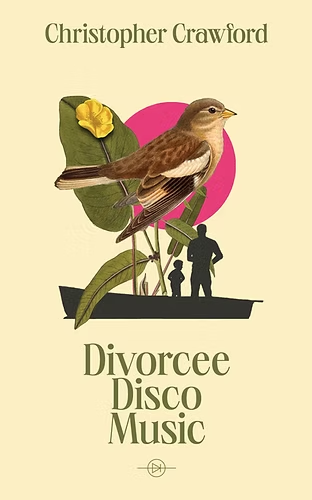
Neither divorcees nor discos make much of an appearance in Christopher Crawford’s magnetic debut, but music – ‘thunder or something/ that sounds like a woman’s laugh’ runs through it. Albeit a strange music, weird echoes of weeping and passion and ‘a whistling sound we might have taken for a voice.’ Crawford is a Prague-based Glaswegian poet whose debut, Divorcee Disco Music, has been long awaited by those familiar with both his poetry and his work as an editor of the online literary magazine B O D Y. The collection opens with an HD Dinken quote about the self being divorced from the self, ‘[w]omen from men, truth from the heart’, which sets the scene for the unsettling work to follow, which explores societal and relationship fracturing.
Starting with a bang, with ‘a throatful of black stars’ being choked up, and the revelation that ‘this must be the day/ the light was trying to hide’, hidden things are constantly uncovered throughout the poems – whether they want to be or not (most often, it seems, the latter). Uneasy childhood recollections form part of the first sequence, with memories of being taught to fish and pranking other boys, as well as the earlier part of the poet’s life spent on the oilrigs of the North Sea (‘a long black muscle/ unspooling itself’). And it’s here, in ‘Old Streets by Prague Castle’, that the poet sets expectations for what he is trying to achieve with his work:
‘Here is a language,
a game, something at play, all questions,
all answers.’
What is being questioned? Many things: relationships, reality, death, the society that binds us and fractures us at once. The second part of the collection goes deeper, tackling failed romantic love – and asks, did it fail if it was once beautiful, even if it did not endure? Even if the poet must now on sleep on ‘the cold floor/ of good times’ and all that’s left is ‘the city’s vanishing point/ crying out it’s terrible waves of silence and power.’ The city – Prague in this case – is very present, although so is Crawford’s Scottish heritage: ‘Prayer to Burns’ is a particular standout piece (‘show me again how Scots can do it all’). Platonic love and friendship come into their own towards the end of the section, with a heartbreaking elegy for Glen Emery, a man who was a Prague institution, though recounted with Crawford’s characteristic wry humility. And that is something that should be highlighted – this book has more than just glimmers of humour, although the tone is self-deprecating. ‘I Go from Town to Town in a Wheelie Bin’ is as funny as the title suggests, and ‘Poets Are Complaining about Editors Again’ will raise a smile from anyone involved in the business of poetry.
There are some misfires – ‘Cellar’, which imagines the viewpoint of Elisabeth Fritzl or someone in the same situation, didn’t quite hit the spot for me and seemed incongruous in the collection, even if it is a well-worked poem. There is a little descent into cliché in ‘One, Two, Three’, with ‘I’m a good person but I do bad things’– although this could be forgiven in that it does encapsulate much of what Crawford is trying to communicate of the character of the speaker of a lot of the poems. Indeed the speaker seems to regard themselves as not good enough for the beautiful women they attract. But when contrasted with such perfectly crafted little poems as ‘Quiet Night In’, you can forgive a slight indulgence.
The third section of the book is happier, more hopeful. The amazing ‘Sea Song for Couples in Love’ is a powerhouse of a metaphor for how we are all ugly until transformed by passion. ‘A Copper Ring’ talks of how ‘every living thing hopes/ somehow to keep on living.’ ‘Eating a Cheese’ and ‘Tomato Toastie’ (my favourite title yet) has the speaker remembering a past lover wistfully but it seems, contentedly. ‘Ars Poetica’ is a cheeky wee poem with a thoughtful undercurrent. What women pissing off bridges has to do with the serious play of poetry is not a sentence I thought I would ever type, but it works very well in this case. And the image of the old watchmaker and his wife shows clearly that Crawford understands love in all its guises, from the passion of youth to the companionship of old age:
‘How he moved his body sometimes
so she knew exactly what he meant.How he probably never thought that
was enough.’
The collection closes with the provocative ‘I’m a Witch!’, which revisits male-female relationship dynamics. It’s a disruptive poem, starting off irreverent and with little respect for the women in question ‘peeking through her lashes.’ But by the end, when the poet is asking ‘which kind of magic woman are you?’ it’s clear that some spell has worked and he is in awe of her power.
And by the end, we’re in awe of the poet’s power, too. This delicacy of feeling and the sheer precision of imagery (‘the black shape of your mouth/ against the frozen sunshine’), which strikes in the poem when you least expect it, make a thought-provoking and satisfying collection. And they bely the hopelessness outlined in ‘the senseless things we have to do/ just because the sun rises over the trees each morning.’ This is a collection that makes sense, from one of the freshest voices in Scottish poetry today.
This book is available through the publisher https://www.bluediode.co.uk/product-page/divorcee-disco-music-by-christopher-crawford
Annie Brechin lives, writes and performs in Edinburgh. Her debut The Mouth of Eulalie was published by Blue Diode Press in March 2022, and How To Make Love is forthcoming September 2025.
